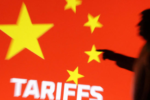In a recent interview with Mary Louise Kelly, Trump adviser Jason Miller discussed the former president’s approach to addressing the nation’s economic challenges, particularly focusing on the issue of rising prices. With inflation still a hot topic for many Americans, the question on everyone’s mind is whether Miller’s answers offer viable solutions or if they’re merely political rhetoric.
The High Stakes of Lowering Prices
Rising prices have been a persistent issue for U.S. consumers, impacting everything from gas and groceries to housing and healthcare. As inflation has surged, many people have felt the squeeze on their wallets. Political figures and their advisers have been under increasing pressure to offer concrete plans to curb inflation and stabilize prices.
During the interview, Kelly, the NPR host, didn’t hold back in pressing Miller about whether the current Republican strategies were sufficient to solve the nation’s economic troubles. Miller, a longtime Trump ally, outlined several key proposals that are expected to be central to Trump’s economic plan in the coming years.
Miller’s Key Points: A Closer Look
- Energy Independence: One of the primary points Miller discussed was the idea of restoring U.S. energy independence. Under Trump, Miller argued, the country became less reliant on foreign oil, which helped keep energy prices down. Miller claimed that by reopening oil pipelines and promoting domestic production, the U.S. could reduce energy costs, which would in turn lower overall prices.
- Tax Cuts for Businesses: Another element of Miller’s pitch was cutting taxes for businesses. He argued that tax cuts would allow companies to pass savings onto consumers in the form of lower prices. However, critics of this approach contend that businesses often use tax cuts to increase profits rather than lowering prices.
- Deregulation: Miller emphasized the need to roll back certain regulations that he argued contribute to higher costs. By reducing the burden on businesses, Miller suggested that goods and services could become more affordable. This includes reducing environmental regulations and easing restrictions on industries such as construction and manufacturing.
- Immigration Reform: A less conventional solution offered by Miller was addressing immigration. He argued that securing the U.S. southern border and implementing stricter immigration policies would help reduce competition for jobs and stabilize the labor market, potentially leading to lower wages and prices. Critics have pointed out that this approach may not directly influence inflation in a meaningful way.
The Reality of the Solutions
While these ideas are not new and have been discussed in various forms during the Trump administration, they have not been without controversy. Critics of these policies argue that the benefits of deregulation and tax cuts for businesses often fail to trickle down to the consumer level. The emphasis on energy independence, while appealing to certain voters, has also raised environmental concerns, as it could potentially lead to greater reliance on fossil fuels.
One of the biggest criticisms of Miller’s proposals is that they focus heavily on long-term goals that may not yield immediate relief for consumers who are feeling the effects of inflation now. Lowering energy prices or cutting business taxes takes time and may not provide instant relief to struggling families.
Kelly’s Tough Questions
Mary Louise Kelly, known for her tough, no-nonsense interviews, didn’t shy away from challenging Miller’s responses. She asked whether Trump’s proposals would have a real impact on inflation or if they were merely a set of political talking points designed to appeal to his base. Miller struggled to provide specific details on how these policies would reduce costs in the short term, instead focusing on the long-term benefits of Trump’s vision for the economy.
One key moment in the interview occurred when Kelly questioned the viability of Miller’s arguments in light of current economic data. The price of consumer goods has continued to rise, and many Americans are looking for tangible solutions. Kelly’s probing questions highlighted the disconnect between political rhetoric and the lived experience of many citizens facing higher costs.
What’s Next for Lowering Prices?
The interview left many wondering whether Trump’s proposed solutions would be enough to tackle inflation and lower prices. The path forward is not clear-cut, and Miller’s comments didn’t provide the immediate answers that many Americans are seeking. While the proposals may have merit in the long term, the question remains: can the country afford to wait for long-term solutions when the impact of rising prices is being felt today?
As the conversation about inflation and economic recovery continues, it’s likely that more proposals will emerge, and the pressure on political leaders to deliver tangible results will only increase. For now, the debate about how best to lower prices is far from over, and it remains to be seen whether any of these proposals will translate into real change for American consumers.
For more detailed coverage on the economic plans being discussed, visit NPR at www.npr.org.
Note: Every piece of content is rigorously reviewed by our team of experienced writers and editors to ensure its accuracy. Our writers use credible sources and adhere to strict fact-checking protocols to verify all claims and data before publication. If an error is identified, we promptly correct it and strive for transparency in all updates.








